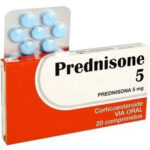How Long Does Prednisone Stay In Your System?

Prednisone is in a class of medications called corticosteroids. It works to treat patients with low levels of corticosteroids by replacing steroids that are normally produced naturally by the body. It works to treat other conditions by reducing swelling and redness and by changing the way the immune system works. Prednisone is not a common drug of abuse. Although obtaining it does require a prescription, it is not listed as a controlled substance by the United States Drug Enforcement Administration (DEA).
Prednisone is used alone or with other medications to treat the symptoms of low corticosteroid levels (lack of certain substances that are usually produced by the body and are needed for normal body functioning). Prednisone is also used to treat other conditions in patients with normal corticosteroid levels.
These conditions include certain types of arthritis; severe allergic reactions; multiple sclerosis (a disease in which the nerves do not function properly); lupus (a disease in which the body attacks many of its own organs); and certain conditions that affect the lungs, skin, eyes, kidneys blood, thyroid, stomach, and intestines. Prednisone is also sometimes used to treat the symptoms of certain types of cancer.
How should prednisone be used?
Prednisone comes as a tablet, delayed-release tablet, as a solution (liquid), and as a concentrated solution to take by mouth. Prednisone is usually taken with food one to four times a day or once every other day. Your doctor will probably tell you to take your dose(s) of prednisone at certain time(s) of day every day. Your personal dosing schedule will depend on your condition and on how you respond to treatment. Follow the directions on your prescription label carefully, and ask your doctor or pharmacist to explain any part you do not understand. Take prednisone exactly as directed. Do not take more or less of it or take it more often or for a longer period of time than prescribed by your doctor.
If you are taking the concentrated solution, use the specially marked dropper that comes with the medication to measure your dose. You may mix the concentrated solution with juice, other flavored liquids, or soft foods such as applesauce.
Swallow the delayed-release tablet whole; do not chew or crush it.
Your doctor may change your dose of prednisone often during your treatment to be sure that you are always taking the lowest dose that works for you. Your doctor may also need to change your dose if you experience unusual stress on your body such as surgery, illness, infection, or a severe asthma attack. Tell your doctor if your symptoms improve or get worse or if you get sick or have any changes in your health during your treatment.
If you are taking prednisone to treat a long-lasting disease, the medication may help control your condition but will not cure it. Continue to take prednisone even if you feel well. Do not stop taking prednisone without talking to your doctor. If you suddenly stop taking prednisone, your body may not have enough natural steroids to function normally. This may cause symptoms such as extreme tiredness, weakness, slowed movements, upset stomach, weight loss, changes in skin color, sores in the mouth, and craving for salt. Call your doctor if you experience these or other unusual symptoms while you are taking decreasing doses of prednisone or after you stop taking the medication.
How Long Does Prednisone Stay In Your System?
The time it takes for the body to eliminate prednisone from the system depends on many factors beyond just the drug, including:
• The dose.
• Presence of other drugs in the body.
• Age.
• Ethnicity.
• Sex.
• Weight.
• Incidence of medical conditions affecting drug elimination, like kidney problems.
Because of these factors, two people using the same substance could have a very different experience. The above individual differences can influence the way the body metabolizes and eliminates the drug, so people of similar weight, sex, and ethnicity are more likely to metabolize drugs similarly.
Once prednisone is consumed, the body begins to metabolize it by breaking apart the molecule or otherwise chemically changing it to facilitate the process of ultimately clearing it from the body.
In general, prednisone will stay in your system for 16.5 to 22 hours. The elimination half life of prednisone is around 3 to 4 hours. This is the time it takes for your body to reduce the plasma levels by half. It usually takes around 5.5 half lives for a drug to be completely eliminated from your system. This is (5.5 x 3) 16.5 hours to (5.5 x 4) 22 hours for Prednisone.
Prednisone and Drug Tests
The use of prednisone can alter your drug test to bring back a false positive due to its similarity in structure to other steroids, it could feasibly cause false-positive readings for anabolic steroids or similar drugs. It has been reported that prednisone (and other immunosuppressive drugs) can cause false-negatives on certain diagnostic tests, like tuberculin (TB) skin and allergy tests since it can reduce immune response. False positives can be gotten if prednisone is used up to a day before the drug test. Prednisone brings back a false positive for steroids since it is a steroid itself. Further experiments are necessary to distinguish false positives that are occasioned by a false positive due to the use of prednisone before the drug test.
Although prednisone and its cousin, prednisolone, are allowed in baseball, they and other glucocorticosteroids are banned by the World Anti-Doping Agency. The systemic use (i.e. intramuscular, intravenous, oral, rectal/suppository) of prednisone is also prohibited by the USADA.





